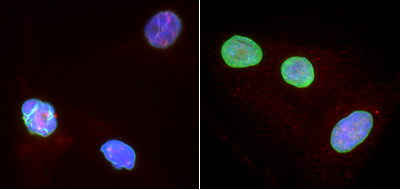Drug reverses accelerated aging
July 5, 2011

Fluorescent microscopy of cell nuclei affected by progeria. The toxic protein progerin, red, accumulating at the edge of the nuclear membrane in the untreated nuclei causes blebbing of the cell membrane that is deleterious to the nuclear structure. The image on the right depicts nuclei treated with rapamycin. (Credit:National Human Genome Research Institute)
An immune-suppressing drug called rapamycin could possibly treat Hutchinson-Gilford progeria syndrome (HGPS), a rare genetic disease that causes premature aging, and advance biological understanding of the normal aging process, according to researchers from the National Human Genome Research Institute (NHGRI) at the National Institutes of Health, the University of Maryland and Massachusetts General Hospital.
Progeria is a genetic disorder characterized by dramatic premature aging.
“Progerin that causes progeria also accumulates, although in very small amounts, in normal aging,” said Dimitri Krainc, M.D., Ph.D., associate professor of neurology at Harvard Medical School. “However, if rapamycin proves to have beneficial effects in lifespan in humans it is safe to assume that it will not be just because it may clear progerin from cells, but also because it clears other toxic products that accumulate during aging.”
Ref.: Francis S. Collins, et al., Rapamycin Reverses Cellular Phenotypes and Enhances Mutant Protein Clearance in Hutchinson-Gilford Progeria Syndrome Cells, Science, 2011; [DOI: 10.1126/scitranslmed.3002346]